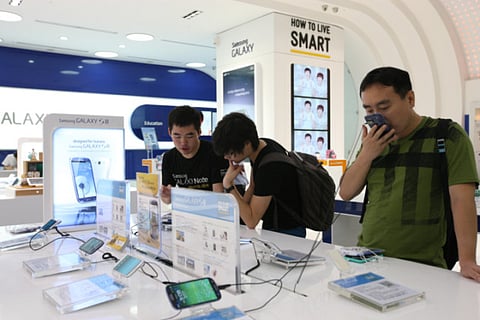Samsung takes on Apple over value of features
Expert claims consumers would pay $100 for patented features

San Jose, California: An Apple Inc expert witness testified yesterday that consumers would be willing to pay $100 (Dh367) for three patented smartphone features that are at issue in its high stakes trial against Samsung Electronics Co Ltd.
John Hauser, a marketing professor at MIT, said he surveyed consumers over the internet about how much they would pay for some of the technology in the lawsuit, like scrolling and multitouch, which Apple claims Samsung stole from the US company.
However, Samsung hammered Hauser on whether his study actually relates to real world customer decision-making.
Additionally, Apple patent portfolio director Boris Teksler described the company’s licensing strategy, saying he could count “on one hand” the number of instances it has permitted other companies to use its design patents. Teksler did not name those companies.
Apple and Samsung are going toe-to-toe in a patents dispute mirroring a struggle for industry supremacy between two rivals that control more than half of worldwide smartphone sales.
Monetary damages
The US company accuses Samsung of copying the design and some features of its iPad and iPhone, and is asking for a sales ban in addition to monetary damages. The Korean company, which is trying to expand in the United States, says Apple infringed some of its key wireless technology patents.
As the second week of trial drew to a close in a San Jose, California federal court, most of the testimony focused on technical patent features.
However, toward the end of the day, Hauser said tablet consumers would be willing to pay $90 for the same patented features as what they would pay $100 for on smartphones. That information could be relevant when calculating potential damages for Apple, which is seeking over $2.5 billion from Samsung.
Samsung attorney William Price asked Hauser why he didn’t tell jurors what consumers would pay for features like additional computer memory on different tablet models. Those could be compared to the real world prices that Apple charges, Price said.
While Hauser said he was confident in his methodology, he eventually acknowledged that his results do not necessarily correspond to what customers would actually pay for such technology in the real world.
“This relates to it but it’s not it, no,” Hauser said.
Licensing core technology patents
Teksler took the stand after Hauser finished. While Apple is open to licensing certain categories of patents, Teksler said, it is highly resistant to giving other companies access to technology it deems core to its “unique user experience.”
All of the patents in Apple’s lawsuit against Samsung fall into that special category, Teksler said.
After Samsung released its Galaxy S phone in the summer of 2010, Teksler said, former Apple chief executive Steve Jobs and current CEO Tim Cook, personally contacted Samsung to complain.
Apple is one of Samsung’s biggest customers for smartphone and tablet component parts.
“We were quite shocked,” Teksler said. “They were a trusted partner.”
Teksler is expected to continue testifying on Monday.
The case in US District Court, Northern District of California, is Apple Inc v. Samsung Electronics Co Ltd et al, No. 11-1846.



